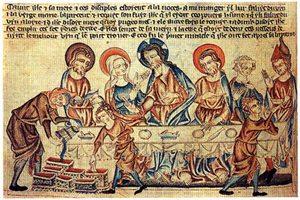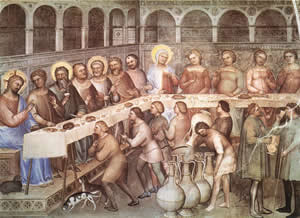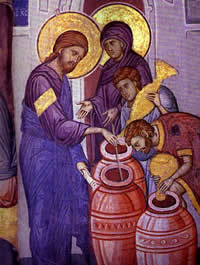Party Time:
The Wedding at Cana
For Sunday January 17, 2010
Lectionary Readings (Revised Common Lectionary, Year C)
Isaiah 62:1–5
Psalm 36:5–10
1 Corinthians 12:1–11
John 2:1–11
Last month my wife's aunt and uncle celebrated their 50th wedding anniversary. We were privileged to help celebrate their original celebration of 1959. Family members gathered in the tiny chapel where Dick and Barb were married and listened to a tape of the ceremony. After dinner and a concert, we gathered in a cabin to share stories, joke about courtship, clarify a few original details, and shed a tear or two over powerful memories of life together across fifty years.
Weddings and feasts loom large in the Bible as metaphors for God's kingdom. Isaiah compares Israel's future joy to a wedding celebration: "As a young man marries a maiden, so will your sons marry you; as a bridegroom rejoices over his bride, so will your God rejoice over you" (Isaiah 62:5). The psalmist for this week describes a feast of abundance for both "man and beast, both high and low" (36:7–8).
Marionite icon. |
Jesus compares God's kingdom to "a king who prepared a wedding banquet for his son," only to have people make feeble excuses about why they couldn't attend (Matthew 22:1–14, Luke 14:16–24). The parable of the ten bridesmaids urges us to remain vigilant, just like we do at life-changing events like a wedding (Matthew 25:1–13). Life in God's kingdom mirrors wedding etiquette: "When someone invites you to a wedding feast, do not take the place of honor, for a person more distinguished than you may have been invited" (Luke 14:8). John imagined a great wedding feast when he conjured the consummation of human history (Revelation 19).
John says that Jesus did "many miraculous signs in the presence of his disciples" (John 20:31). The very first one was at a wedding at Cana in Galilee, about nine miles northwest of his home in Nazareth (John 2:1–11). To the embarrassment of the host, the wedding wine ran dry. With his mother Mary and his disciples present, Jesus filled six stone pots used by Jews for ritual washings with water (they had been empty), and then turned the water into wine.
The miracle bespeaks both quantity and quality. Each pot held twenty to thirty gallons, so the result was some 150 gallons of wine, far beyond what the revelers needed. There's an inverse ratio between the rather trivial problem of running out of wine at a wedding and the bizarre abundance of the solution. Furthermore, whereas most hosts serve the best wine first when people will appreciate the quality, and cheaper wine later when no one can taste the difference, Jesus reversed the pattern by saving the best for last.
 |
Wedding at Cana. |
The God that Jesus revealed is a God of lavish liberality, generosity and extravagance. He calls us from emptiness to excess, from the least to the best. Celebrating God's extravagant excess is a prominent theme in the Scriptures.
In Deuteronomy 14:22–26 the Hebrews are commanded to tithe of their agricultural produce by eating it in the presence of the Lord at a precise time and place. But what if someone was too far away for this to be practical, and still wanted to remain faithful to the command? "Then you shall exchange your produce for money, and bind the money in your hand, and spend the money for whatever your heart desires; and there you shall eat in the presence of the Lord your God and rejoice, you and your household" (Deuteronomy 14:24–26). In other words, to fulfill God's command to tithe, throw a party.
In the parable of the workers in the vineyard, a foreman hired laborers early in the morning, then successively throughout the day at the third, sixth, ninth, and eleventh hours. A twelve-hour day of manual labor, with the "burden of the work and the heat of the day" (Matthew 20:12), is a long day. That evening, the foreman settled accounts, paying those who had worked a meager one hour the same as those who had worked twelve hours.
 |
Giusto de Menabuoi, 1376-1378. |
Then there's the story of Mary in John 12:1–8. At a dinner to honor Jesus, Martha busied herself with the details of the banquet. But Mary worshipped Jesus with an extravagantly expensive gesture. She poured a pint of perfume on Jesus's feet, then wiped his feet with her hair. The text says that the perfume was worth a year's wages, and the reaction of the disciples was predictable. What is going on?! We should have sold that perfume and given the money to the poor! I wonder what my Christian friends would think if I “wasted” an entire year's salary on a single act of worshipful celebration.
Nehemiah recounts the humiliating defeat of Judah by pagan Babylon, the survival of a demoralized remnant, then their improbable efforts to rebuild the ruins of Jerusalem years later under the Persian king Artaxeres. When Nehemiah heard the story of his people's “great distress and reproach,” he wept, mourned, fasted and prayed for days on end. He also rebuilt the fallen walls of Jerusalem.
Once rebuilt, the people gathered in the public square to hear Ezra read the law of Moses. Overcome with bittersweet emotions, the people wept. Then Nehemiah said to all the people, “This day is holy to the Lord; do not mourn or weep.” For all the people were weeping when they heard the words of the law. Then he said to them, “Go, eat of the fat, drink of the wine, and send portions to him who has nothing prepared; for this day is holy to our Lord. Do not be grieved, for the joy of the Lord is your strength.”
And so they did. The people went away to eat, to drink, and to celebrate a great festival. Yes, there was a proper time to grieve the devastation of Jerusalem; but there also came a time to move forward and to rejoice, however modest the remnant's circumstances compared with former times and expectations. There was then and is today a time to "eat the fat and drink the sweet wine" (Nehemiah 8:9–12).
 |
14th-century fresco. |
These stories remind me of the Danish film Babette's Feast, which won a 1988 Academy Award for the best foreign film. The story unfolds in the late nineteenth century in a small fishing village on the dank and dreary Jutland coast of Denmark. Two sisters have given up their own ambitions to care for their father, an elderly pastor of a stern and tiny church. Their band of dour Christians learn the meaning of God's extravagant grace from a most unlikely source when a French refugee named Babette invades their small world. In a highly symbolic act, Babette, who was a famous chef in Paris, cooks the villagers a sumptuous feast. At first the pinched villagers can't allow themselves to enjoy such extravagance. But they loosen up and learn to accept celebration, excess, and abundance.
At Cana in Galilee Jesus filled and fulfilled the ancient promises of Judaism. He filled the empty pots used for ritual purity with wine used for secular celebration. He didn't merely announce a coming reign of God, or direct attention away from himself to some other. With the first of his "many miraculous signs" he demonstrated that somehow and in some unsurpassed manner he revealed the glory and character of God like no other. This friend of sinners, accused of being a glutton and drunkard, revealed a God of extravagant goodness and mercy.
For further reflection
* Watch the film Babette's Feast (1988).
* Why do some Christians find it hard to accept God's extravagant grace?
* Consider the gospel theme of the most grace for the least deserving.
* Another gospel party in Luke 15: a ring, a robe, and a party for the prodigal son.
Image credits: (1) Marionite Hertiage; (2) Utstein Kloster; (3) Web Gallery of Art; and (4) Frescoes of Medieval Serbia and Macedonia.





